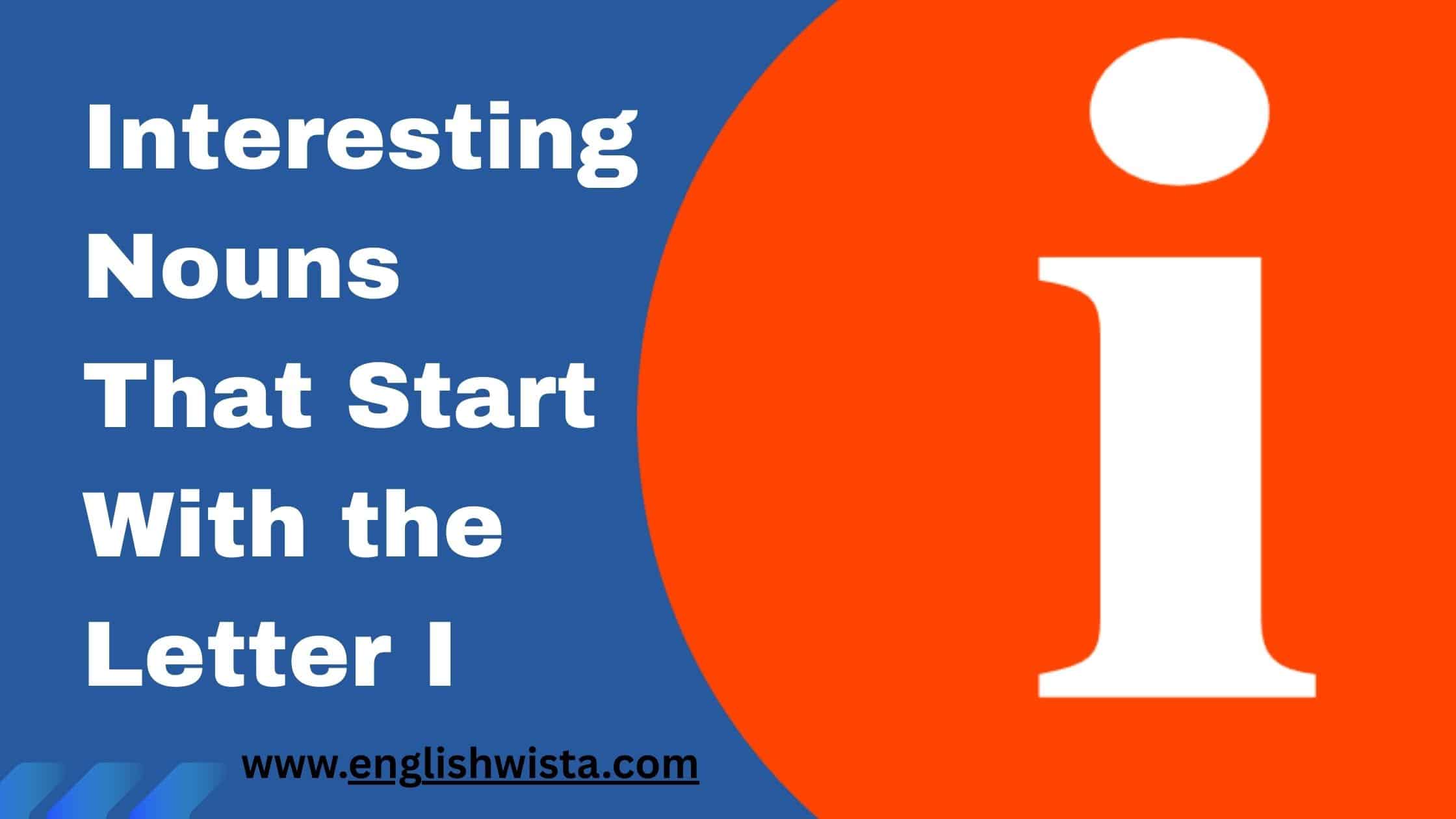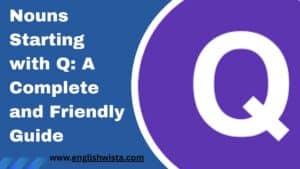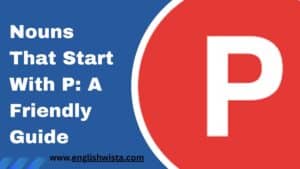Have you ever noticed how some words just sound interesting? The letter I is one of those special letters. It doesn’t pop up as often as “S” or “T,” but when it does, it creates some really cool words.
Today, we’re going to explore nouns that start with I. Don’t worry this won’t feel like a boring grammar lesson. Think of it as a fun chat where we look at useful words, how to use them in sentences, and even discover a few fun facts along the way.
By the end of this article, you’ll feel more confident using “I” nouns in your daily conversations or writing. Ready? Let’s jump in!
What Exactly Is a Noun?
Before we dive into “I” nouns, let’s quickly remind ourselves what a noun is.
A noun is simply:
- A person (like inventor)
- A place (like island)
- A thing (like ice)
- An idea (like imagination)
Think of nouns as the names we give to everything around us. If you can see it, touch it, visit it, or even think about it, it’s probably a noun.
So now that’s clear, let’s focus on those that start with I.
Why Learn Nouns That Start With I?
You might wonder, “Why bother focusing on just one letter?” Great question! Here are a few reasons:
- Vocabulary growth: You’ll sound more fluent and natural in English.
- Better writing: Interesting words can make your sentences pop.
- Confidence boost: When you know more words, you speak and write with ease.
Plus, many “I” nouns are fun and powerful. Words like integrity or imagination aren’t just ordinary they carry big meanings.
Common Nouns That Start With I
Let’s start with a list of everyday nouns beginning with I. These are words you’re likely to hear often.
- Ice – frozen water.
- Idea – a thought or plan.
- Island – land surrounded by water.
- Insect – a small bug like an ant or bee.
- Instrument – a tool, or a musical object like a guitar.
- Internet – the online world we use every day.
- Invitation – a request to join an event.
- Importance – the quality of being valuable.
These are not too hard, right? Let’s make them real with some sentences.
Examples:
- The ice in my glass melted quickly.
- She shared a new idea for our project.
- We visited a small island on our trip.
- That insect is buzzing near the window.
- He plays a musical instrument every evening.
- The internet helps us learn many things.
- I got an invitation to his birthday party.
- Education has great importance in life.
See how simple and natural they sound? That’s the magic of nouns.
Abstract Nouns Starting With I
Not all nouns are things we can see. Some are abstract nouns, which are names for feelings, qualities, or ideas.
Here are a few:
- Imagination – the ability to create pictures in your mind.
- Integrity – honesty and strong morals.
- Intelligence – the ability to learn and understand.
- Inspiration – something that motivates you.
- Independence – freedom to do things on your own.
Examples in Sentences:
- Children have wonderful imagination when they play.
- A leader should always show integrity.
- Her intelligence amazed everyone in the class.
- That speech gave me great inspiration.
- After moving out, he enjoyed his independence.
Abstract nouns are powerful because they give shape to invisible things our feelings and values.
Is Ice Singular or Plural?
Good question! Some nouns can be tricky.
The word ice is usually uncountable. That means we don’t normally say “ices” when we’re talking about frozen water. We just say “ice.”
- Correct: There is ice in the fridge.
- Incorrect: There are ices in the fridge.
But here’s a fun twist sometimes in English, “ices” is used to mean sweet frozen desserts, like flavored ice cream.
- We ate fruit ices at the fair.
So, remember:
- Ice (frozen water) → uncountable.
- Ices (desserts) → plural countable.
Where Do Some I Nouns Come From?
Many “I” nouns have interesting origins. Let’s look at a few:
- Island – comes from Old English īegland, meaning “water land.”
- Idea – comes from Greek idéa, meaning “form” or “pattern.”
- Imagination – comes from Latin imaginatio, meaning “picture in the mind.”
- Internet – comes from “interconnected network.”
Isn’t it fun to see how words traveled from history into our daily life?
Collective Nouns Starting With I
Collective nouns are words that describe groups of things.
Some cool examples with “I”:
- An illusion of magicians (fun, creative phrase).
- An intrigue of spies (sounds mysterious, right?).
- An infestation of insects (not as pleasant, but useful!).
Example Sentences:
- The town watched an illusion of magicians at the festival.
- An intrigue of spies makes a great movie plot.
- The garden had an infestation of insects after the rain.
These are less common, but they make your English richer and more colorful.
Fun Nouns That Start With I for Everyday Life
Let’s list a few extra words you might enjoy using:
- Iceberg – huge floating ice in the ocean.
- Ink – liquid used for writing or printing.
- Iron – a metal, or the tool you use to press clothes.
- Income – money you earn.
- Industry – a type of business or work.
- Interview – a meeting for questions and answers.
Examples:
- The ship hit an iceberg.
- He spilled ink on the paper.
- She used an iron to smooth her shirt.
- His income increased last year.
- The tech industry is growing fast.
- She prepared well for her interview.
These are useful in both speaking and writing.
Nouns With People and Jobs
Lots of nouns beginning with “I” describe people:
- Immigrant – a person who moves to another country.
- Inventor – someone who creates new things.
- Instructor – a teacher or trainer.
- Investor – someone who gives money to grow a business.
- Inspector – a person who checks for problems.
Examples:
- The immigrant started a new life abroad.
- Thomas Edison was a famous inventor.
- The driving instructor taught me well.
- The investor believed in the new company.
- The inspector found the building safe.
These are very practical nouns you’ll see in news, stories, or conversations.
Let’s Practice With Sentences
To really remember words, it helps to see them in action. Here are some mixed examples:
- My idea is to travel to an island next summer.
- The insect landed on my book.
- Her imagination makes her stories exciting.
- The internet has changed the world.
- He showed integrity by telling the truth.
- The invitation arrived yesterday.
- The inventor shared his creation with investors.
- The inspector gave the building a high rating.
When you practice, try replacing one word with another. For example, switch “idea” with “imagination.” This helps you get comfortable using different nouns.
Fun Facts About I Nouns
Here are some extras to keep things fun:
- The word igloo comes from the Inuit language, meaning “house made of snow.”
- Infinity is a noun that represents something without end it’s also a symbol (∞).
- The word identity is often linked to who we are, but it originally comes from Latin meaning “the same.”
- Ink was first made thousands of years ago from soot and plants.
Cool, right? Words carry little pieces of history with them.
Quick Review: Key Takeaways
Let’s repeat the most important points so they stick in your memory:
- Nouns are names for people, places, things, and ideas.
- Many useful nouns start with I, like ice, idea, island, imagination, and integrity.
- Some nouns are concrete (you can see or touch them), while others are abstract (you can only think about them).
- “Ice” is usually uncountable, but “ices” can mean frozen treats.
- Collective nouns like infestation of insects are creative ways to describe groups.
- Origins of words like idea and island show us the history of language.
Conclusion: Keep Playing With I Nouns
So, there you have it a deep dive into nouns that start with the letter I. We’ve looked at simple ones like ice and idea, more abstract ones like integrity, fun collective nouns, and even a few job-related nouns like inventor.
The best way to learn them is to use them often. Try writing a short story using ten nouns from this article. Or challenge a friend: “How many I-nouns can you think of in one minute?”
Language learning should always feel playful, not stressful. Every new noun you learn is another tool in your toolbox. And now, you’ve added a whole set of “I” tools!
Keep exploring, keep practicing, and most importantly keep having fun with English



